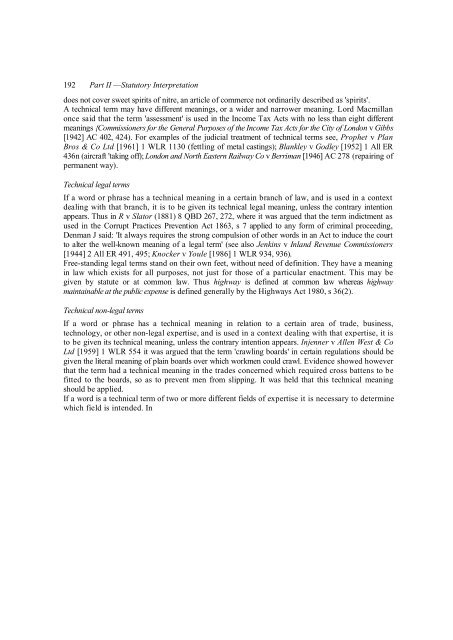Statutory Interpretation The Technique of Statutory ... - Francis Bennion
Statutory Interpretation The Technique of Statutory ... - Francis Bennion
Statutory Interpretation The Technique of Statutory ... - Francis Bennion
You also want an ePaper? Increase the reach of your titles
YUMPU automatically turns print PDFs into web optimized ePapers that Google loves.
192 Part II —<strong>Statutory</strong> <strong>Interpretation</strong><br />
does not cover sweet spirits <strong>of</strong> nitre, an article <strong>of</strong> commerce not ordinarily described as 'spirits'.<br />
A technical term may have different meanings, or a wider and narrower meaning. Lord Macmillan<br />
once said that the term 'assessment' is used in the Income Tax Acts with no less than eight different<br />
meanings {Commissioners for the General Purposes <strong>of</strong> the Income Tax Acts for the City <strong>of</strong> London v Gibbs<br />
[1942] AC 402, 424). For examples <strong>of</strong> the judicial treatment <strong>of</strong> technical terms see, Prophet v Plan<br />
Bros & Co Ltd [1961] 1 WLR 1130 (fettling <strong>of</strong> metal castings); Blankley v Godley [1952] 1 All ER<br />
436n (aircraft 'taking <strong>of</strong>f); London and North Eastern Railway Co v Berriman [1946] AC 278 (repairing <strong>of</strong><br />
permanent way).<br />
Technical legal terms<br />
If a word or phrase has a technical meaning in a certain branch <strong>of</strong> law, and is used in a context<br />
dealing with that branch, it is to be given its technical legal meaning, unless the contrary intention<br />
appears. Thus in R v Slator (1881) 8 QBD 267, 272, where it was argued that the term indictment as<br />
used in the Corrupt Practices Prevention Act 1863, s 7 applied to any form <strong>of</strong> criminal proceeding,<br />
Denman J said: 'It always requires the strong compulsion <strong>of</strong> other words in an Act to induce the court<br />
to alter the well-known meaning <strong>of</strong> a legal term' (see also Jenkins v Inland Revenue Commissioners<br />
[1944] 2 All ER 491, 495; Knocker v Youle [1986] 1 WLR 934, 936).<br />
Free-standing legal terms stand on their own feet, without need <strong>of</strong> definition. <strong>The</strong>y have a meaning<br />
in law which exists for all purposes, not just for those <strong>of</strong> a particular enactment. This may be<br />
given by statute or at common law. Thus highway is defined at common law whereas highway<br />
maintainable at the public expense is defined generally by the Highways Act 1980, s 36(2).<br />
Technical non-legal terms<br />
If a word or phrase has a technical meaning in relation to a certain area <strong>of</strong> trade, business,<br />
technology, or other non-legal expertise, and is used in a context dealing with that expertise, it is<br />
to be given its technical meaning, unless the contrary intention appears. Injenner v Allen West & Co<br />
Ltd [1959] 1 WLR 554 it was argued that the term 'crawling boards' in certain regulations should be<br />
given the literal meaning <strong>of</strong> plain boards over which workmen could crawl. Evidence showed however<br />
that the term had a technical meaning in the trades concerned which required cross battens to be<br />
fitted to the boards, so as to prevent men from slipping. It was held that this technical meaning<br />
should be applied.<br />
If a word is a technical term <strong>of</strong> two or more different fields <strong>of</strong> expertise it is necessary to determine<br />
which field is intended. In

















